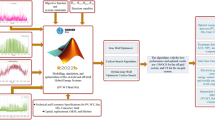Abstract
Although renewable energy grows to be progressively trendier in the universal power grid, enhancing the precision or accuracy is a crucial task. Therefore, managing, operating and planning of modern power systems become difficult in case of renewable energy load forecasting. Due to the intermittent and disordered nature of renewable resources, load forecasting becomes a complicated task. The renewable energy system introduces various approaches to enhance load forecasting accuracy. This paper describes the technofeasibility and the optimal design of HRE resources such as photovoltaic, wind turbine, biogasifiers, and battery to satisfy all power demand optimally using a hybrid algorithm. The hybrid algorithm is the grouping of DRNN, memetic and cuckoo search algorithm to form a proposed HMCS-DRNN approach. This proposed approach is employed to provide better optimization performances, and apart from precision and stability in load forecasting, the HMCS-DRNN approach offers the predicted result with better efficiency and minimum error value rate. The efficiency of the proposed approach articulates by calculating the statistical measure regarding RMSE and MAPE, respectively. The simulation results describe that the performances of the HMCS algorithm provide better optimization results on various 30 unconstrained benchmark functions.










Similar content being viewed by others
References
Bai X, Peng N, Gang M, Tian L (2015) Spatial load forecasting based on multilevel cluster analysis and support vector machine. Autom Electr Power Syst 12(39):56–61
Chemetova S, Santos PJ, Ventim Neves M (2016) Load peak forecasting in different load patterns situations. In: 2016 10th international conference on compatibility, power electronics and power engineering. IEEE, pp 148–151
Chemetova SR, Santos P, Ventim Neves M (2017) Short term load forecasting in smart grids: case study of the city of Evora. J Inf Syst Eng Manag 2(3):18
Crepinsek M, Mernik M, Liu SH (2011) Analysis of exploration and exploitation in evolutionary algorithms by ancestry trees. Int J Innov Comput Appl 1(3):11–19
Dincer I, Acar C (2017) Smart energy systems for a sustainable future. Appl Energy 194:225–235
Dutta S, Li Y, Venkataraman A, Costa LM, Jiang T, Plana R, Tordjman P, Choo FH, Foo CF, Puttgen HB (2017) Load and renewable energy forecasting for a microgrid using persistence technique. Energy Procedia 143:617–622
Giacometto F, Sala E, Kampouropoulos, Romeral L (2015) Short term load forecasting using Cartesian genetic programming: an efficient evolutive strategy. IEEE, pp 005087–005094
Holjevac N, Soares C, Kuzle I (2017) Short term power system hourly load forecasting using artificial neural networks. Energija 66:1–4
Jatin B, Durga T (2019) Deep learning framework to forecast electricity demand. Appl Energy 238:1312–1326
Kaur A, Nonnenmacher L, Coimbra CF (2016) Net load forecasting for high renewable energy penetration grids. Energy 114:1073–1084
Li Y, Yuan X, Xu J, Chen Z, Mei F, Liu H (2018) Medium term forecasting of cold, electric and gas load in multi energy system based on VAR model. IEEE pp 1676–1680
Liang Y, Niu D, Hong WC (2019) Short term load forecasting based on feature extraction and improved general regression neural network model. Energy 166:653–663
Lindberg KB, Seljom P, Madsen H, Fischer D, Korpas M (2019) Long term electricity load forecasting: current and future trends. Util Policy 58:102–119
Liu B, Nowotarski J, Hong T, Weron R (2015) Probabilistic load forecasting via quantile regression averaging on sister forecasts. IEEE Trans Smart Grid 8(2):730–737
Nasle A (2015) Systems and methods for automatic real time capacity assessment for use in real time power analytics of an electrical power distribution system. United States patent US, 8 (959):006
Nespoli A, Ogliari E, Leva S, Pavan AM, Mellit A, Lughi V, Dolara A (2019) Day-ahead photovoltaic forecasting: a comparison of the most effective techniques. Energies 12(9):1621
Panapakidis IP, Dagoumas AS (2016) Day ahead electricity price forecasting via the application of artificial neural network based models. Appl Energy 172:132–151
Rejeesh MR (2019) Interest point based face recognition using adaptive neuro fuzzy inference system. Multimedia Tools Appl 78(16):22691–22710
Saez D, Avila F, Olivares D, Cañizares C, Marin L (2014) Fuzzy prediction interval models for forecasting renewable resources and loads in microgrids. IEEE Trans Smart Grid 6(2):548–556
Safi SK, White AK (2017) Short and long term forecasting using artificial neural networks for stock prices in Palestine. Electron J Appl Stati stical Anal 10(1):14–28
Sundararaj V (2016) An efficient threshold prediction scheme for wavelet based ECG signal noise reduction using variable step size firefly algorithm. Int J Intell Eng Syst 9(3):117–126
Sundararaj V (2019) Optimised denoising scheme via opposition-based self-adaptive learning PSO algorithm for wavelet-based ECG signal noise reduction. Int J Biomed Eng Technol 31(4):325
Sundararaj V, Muthukumar S, Kumar RS (2018) An optimal cluster formation based energy efficient dynamic scheduling hybrid MAC protocol for heavy traffic load in wireless sensor networks. Comput Secur 77:277–288
Vinu S (2019) Optimal task assignment in mobile cloud computing by queue based ant-bee algorithm. Wirel Pers Commun 104(1):173–197
Wang H, Ruan J, Wang G (2018) Deep learning based interval state estimation of AC smart grids against sparse cyber attacks. IEEE Trans Ind Inf 14(11):4766–4778
Wang H, Lei Z, Zhang X, Zhou B, Peng J (2019) A review of deep learning for renewable energy forecasting. Energy Convers Manag 198:111799
Zhang Z, Ding S, Jia W (2019) A hybrid optimization algorithm based on cuckoo search and differential evolution for solving constrained engineering problems. Eng Appl Artif Intell 85:254–268
Author information
Authors and Affiliations
Corresponding author
Ethics declarations
Conflict of interest
The authors declare that they have no conflict of interest.
Human and animal rights
This article does not contain any studies with human or animal subjects performed by any of the authors.
Informed consent
Informed consent was obtained from all individual participants included in the study.
Additional information
Communicated by V. Loia.
Publisher's Note
Springer Nature remains neutral with regard to jurisdictional claims in published maps and institutional affiliations.
Rights and permissions
About this article
Cite this article
Sengar, S., Liu, X. Optimal electrical load forecasting for hybrid renewable resources through a hybrid memetic cuckoo search approach. Soft Comput 24, 13099–13114 (2020). https://doi.org/10.1007/s00500-020-04727-9
Published:
Issue Date:
DOI: https://doi.org/10.1007/s00500-020-04727-9




